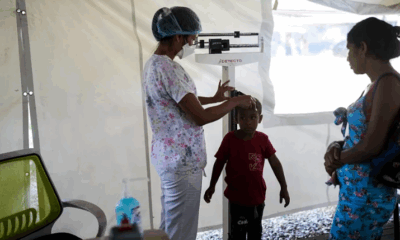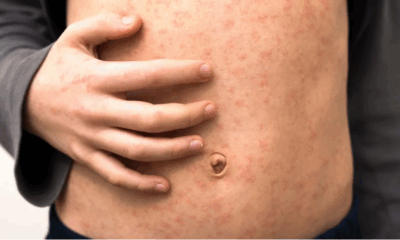Health
Regular Egg Consumption Linked to Lower Cardiovascular Disease Risk, Study Finds
A new study suggests that regular egg consumption could be associated with a lower risk of cardiovascular disease-related deaths among older adults. Researchers from Monash University in Australia found that individuals who consumed up to six eggs per week had a 29% lower risk of dying from cardiovascular disease (CVD) compared to those who ate eggs less frequently.
Study Findings
The study, published in the journal Nutrients, tracked more than 8,700 adults aged 70 years or older. Participants who reported eating between one and six eggs per week also had a 15% lower risk of death from any cause, compared to those who ate eggs only twice a month or less.
“Our results suggest that eating up to six eggs a week may reduce the risk of death from all causes and cardiovascular-related diseases in older adults,” said Holly Wild, a lecturer in epidemiology and preventive medicine at Monash University.
The findings could contribute to the development of evidence-based dietary guidelines for older adults, she added.
Nutritional Benefits of Eggs
Eggs are a rich source of protein and essential nutrients, including B vitamins, folate, unsaturated fatty acids, fat-soluble vitamins (E, D, A, and K), choline, and minerals. However, egg consumption has long been debated due to concerns about cholesterol levels, which can lead to blocked blood vessels, heart problems, or strokes.
To address this concern, the research team also analyzed the impact of egg consumption among participants with clinically diagnosed high cholesterol (dyslipidemia). Their findings showed that those with dyslipidemia who ate eggs weekly had a 27% lower risk of CVD-related death compared to those who rarely or never ate eggs.
“This suggests that in our study cohort, the presence of high cholesterol does not influence the risk associated with egg consumption,” Wild said.
Dietary Recommendations
While dietary guidelines on egg consumption vary globally, a 2020 review by the American Heart Association concluded that healthy individuals can safely consume up to seven eggs per week.
With increasing evidence supporting the health benefits of eggs, researchers believe their findings could help refine dietary recommendations for older adults, emphasizing their potential role in reducing mortality risk.
Health
Europe Pays Less for Medicines Than the U.S., but Prices Still Vary Widely by Country
Health
Global Nurse Shortage Worsened by European Reliance on Foreign Healthcare Workers, WHO Warns
Health
Early-Onset Cancer Rates Rising in U.S., But Deaths Mostly Stable, Study Finds

A new U.S. government study has revealed that while cancer diagnoses among people under 50 are on the rise, the overall death rates for most types of cancer in this age group remain stable.
Published Thursday in the journal Cancer Discovery, the study is one of the most comprehensive assessments to date of early-onset cancers, analyzing data from more than two million cases diagnosed in Americans aged 15 to 49 between 2010 and 2019.
The findings show that 14 out of 33 cancer types had increasing incidence rates in at least one younger age group. The most significant increases were seen in breast, colorectal, kidney, and uterine cancers. Women accounted for about 63 percent of the early-onset cases.
“This pattern generally reflects something profound going on,” said Tim Rebbeck of the Dana-Farber Cancer Institute, who was not involved in the study. “We need to fund research that will help us understand why this is happening.”
The study found that, compared to 2010 data, there were 4,800 more breast cancer cases, 2,000 additional colorectal cancers, 1,800 more kidney cancers, and 1,200 extra uterine cancers by 2019.
Despite the rising numbers, researchers emphasized a key reassurance: death rates for most of these cancers are not increasing. However, exceptions were noted—colorectal, uterine, and testicular cancers saw slight rises in mortality among younger adults.
The causes behind the rise in early-onset cancers are not fully understood. The study’s datasets do not include information on potential risk factors such as obesity, lifestyle, or access to healthcare. However, researchers, including lead author Dr. Meredith Shiels of the National Cancer Institute, highlighted obesity as a possible driver.
“Several of these cancer types are known to be associated with excess body weight,” said Dr. Shiels. She also pointed to advances in detection and changing screening practices as possible contributors to earlier diagnoses.
Breast cancer trends may also be influenced by shifting reproductive patterns, such as women having children later in life, which has been associated with increased cancer risk due to fewer years of pregnancy and breastfeeding—factors known to lower risk.
Not all cancer types followed the upward trend. Rates of more than a dozen cancers, including lung and prostate cancer, are decreasing among younger people. Researchers attribute the lung cancer decline to reduced smoking rates, while updated PSA screening guidelines are likely behind the drop in prostate cancer diagnoses.
Experts plan to convene later this year to further investigate the growing early-onset cancer burden and explore targeted prevention strategies.
-

 Business12 months ago
Business12 months agoSaudi Arabia’s Model for Sustainable Aviation Practices
-

 Business12 months ago
Business12 months agoRecent Developments in Small Business Taxes
-

 Politics12 months ago
Politics12 months agoWho was Ebrahim Raisi and his status in Iranian Politics?
-

 Business10 months ago
Business10 months agoCarrectly: Revolutionizing Car Care in Chicago
-

 Business11 months ago
Business11 months agoSaudi Arabia: Foreign Direct Investment Rises by 5.6% in Q1
-

 Technology12 months ago
Technology12 months agoComparing Apple Vision Pro and Meta Quest 3
-

 Politics12 months ago
Politics12 months agoIndonesia and Malaysia Call for Israel’s Compliance with ICJ Ruling on Gaza Offensive
-

 Sports9 months ago
Sports9 months agoKeely Hodgkinson Wins Britain’s First Athletics Gold at Paris Olympics in 800m






























